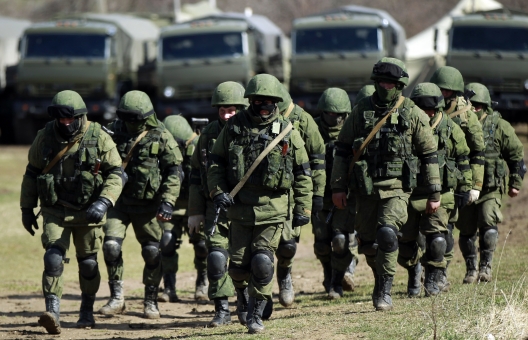 NATO should think through the implications of the little green men phenomenon, in particular for the Baltic states of Estonia and Latvia. . . .
NATO should think through the implications of the little green men phenomenon, in particular for the Baltic states of Estonia and Latvia. . . .
This may not be a high-likelihood event, but it certainly is not a zero probability. Moscow regularly complains about the treatment of ethnic Russians in the Baltics, and Putin has asserted a right to intervene in other states to defend ethnic Russians and Russian-speakers, regardless of their nationality.
Putin, moreover, openly displays a strong sense of grievance against NATO. He might find attractive the idea of a plausible-denial operation that could challenge the security of a NATO member and undermine Alliance solidarity and credibility. The relatively limited investment that Moscow has made in fueling armed separatism has certainly sewn chaos in eastern Ukraine.
NATO members should be discussing now how the Alliance would respond if, say, soldiers without insignia assisted by locals were to seize a local administration building in eastern Estonia, just across the border from Russia. The first question would be whether NATO would consider this an internal problem for Estonia to handle itself or treat it as an Article 5 contingency, requiring that allies consider it an attack on all. . . .
This will not be an easy discussion. Some allies could well take the position that, absent compelling evidence of Russian involvement, such a crisis would be an internal security matter, to be addressed by Estonia’s own police and security forces. That might disappoint the Estonian government, but it would be useful for Tallinn to know.
If, on the other hand, NATO allies were inclined to consider this kind of case as having Article 5 implications, the Alliance should discuss what response would make sense and plan accordingly. That includes how NATO might assist Estonian security forces. . . .
Local forces in Estonia (or Latvia) might well be capable of carrying out such an operation on their own. But NATO pre-planning and involvement would augment their capabilities. It would also send important political signals: first, a message of support to governments that could find themselves victims of a little green men attack, and second, a message to the Kremlin that the tactic would not work against a NATO member.
Steven Pifer, a senior fellow at the Brookings Institution, is a former US ambassador to Ukraine.
Image: Armed men, believed to be Russians, near military base in Perevalnoye, March 17, 2014 (photo: Reuters)
